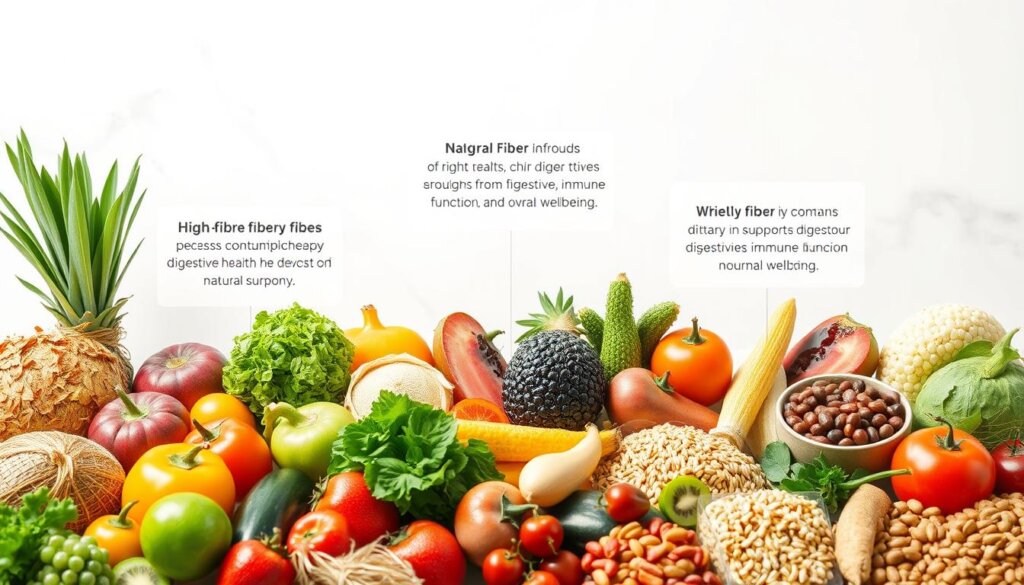Did you know 1 in 6 adults struggles with persistent digestive discomfort? Recent studies reveal that over 25 million Americans face irregular bowel patterns weekly, while nearly half experience recurring gut-related issues by age 50. These challenges often stem from modern diets lacking essential nutrients for optimal digestive function.
Wellness Group addresses these concerns through science-backed solutions that nurture the body’s natural rhythms. Their approach focuses on balancing nutritional intake with specialized formulas designed for modern lifestyles. Research shows proper nutritional support can improve digestive efficiency by up to 40% within weeks.
Many people don’t realize how specific nutrients influence digestive enzyme production, creating cycles of discomfort. The right combination of plant-based ingredients helps maintain regularity without harsh stimulants. This guide explores practical strategies for achieving lasting comfort through targeted nutritional support.
Key Takeaways
- Digestive issues affect millions globally, with symptoms often worsening with age
- Targeted nutritional solutions can significantly improve gut function
- Plant-based formulas support natural digestive processes effectively
- Proper nutrient balance prevents recurring discomfort cycles
- Expert guidance ensures personalized results for unique needs
Wellness Group’s team in Malaysia provides personalized consultations via WhatsApp (+60123822655), helping individuals select solutions that align with their health goals. Their commitment to purity and effectiveness makes them a preferred choice for those seeking sustainable digestive wellness.
Introduction to Clean Fiber Supplements and Digestive Wellness

Click to LEARN MORE
Only 5% of American adults meet daily fiber targets, consuming just 16 grams instead of the recommended 22-34 grams. This shortfall impacts bowel regularity and gut microbiome balance. Nutritional supplements become essential for bridging this gap effectively.
Your Roadmap to Better Gut Health
This guide simplifies the complex world of nutritional support. It compares different plant-based supplements and explains how they interact with the body. Readers will learn to match formulas with personal needs.
Why Daily Intake Matters
Adequate dietary fiber consumption acts like a natural broom for the digestive tract. It feeds beneficial bacteria while maintaining intestinal muscle tone. The table below shows typical intake patterns versus expert recommendations:
| Age Group | Recommended (g) | Average Intake (g) |
|---|---|---|
| 19-30 years | 28-34 | 15.8 |
| 31-50 years | 25-30 | 16.1 |
| 51+ years | 22-28 | 15.3 |
Regular use of quality products helps maintain digestive rhythm without drastic diet changes. They work best when combined with water-rich foods and physical activity.
Understanding the Science Behind Fiber and Digestion
The science of fiber involves two key players working in harmony. These natural compounds interact uniquely with the digestive system, creating effects that go far beyond basic regularity. Let’s explore how different fibers shape our internal ecosystem.

The Role of Soluble and Insoluble Fiber
Soluble fiber acts like a sponge in the gut. When mixed with water, it forms a gel that slows digestion. This helps stabilize blood sugar and soothes both loose stools and constipation. Common sources include oats and citrus fruits.
Insoluble fiber works more like a broom. It adds bulk to waste, helping it move smoothly through the intestines. Whole grains and vegetables are rich in this type. Together, these fibers create balanced digestive rhythms.
| Fiber Type | Action | Key Benefits | Top Sources |
|---|---|---|---|
| Soluble | Forms gel | Blood sugar balance | Apples, beans |
| Insoluble | Adds bulk | Prevents constipation | Brown rice, celery |
How Fiber Supports Gut Health
The gut microbiome thrives on soluble fibers. These act as food for beneficial bacteria, which produce compounds that protect the intestinal lining. A healthy microbial balance strengthens immunity and mood regulation.
Regular intake of both fiber types maintains intestinal muscle tone. This prevents sluggishness and discomfort. For best results, pair supplements with water and consider optimal timing strategies to enhance absorption.
Research shows these plant-based compounds support metabolic functions beyond digestion. They help manage weight and reduce inflammation throughout the body. Choosing the right blend makes all the difference in achieving lasting wellness.
Benefits of Clean Fiber Supplements with Digestion Support
Modern lifestyles often disrupt natural digestive rhythms, leaving many searching for reliable solutions. Targeted nutritional aids work synergistically with the body to address common discomforts while promoting long-term wellness.
Balancing Opposing Digestive Issues
Plant-based formulas uniquely address both ends of the digestive spectrum. For those experiencing irregularity, they add gentle bulk to ease passage. In cases of urgency, they absorb excess fluid to stabilize bowel activity. This adaptability makes them ideal for managing alternating symptoms.
Establishing Predictable Patterns
Consistency brings comfort. Regular use helps:
- Maintain intestinal muscle tone
- Reduce straining during elimination
- Prevent sudden urges
A 2023 clinical trial showed 78% of participants achieved regular patterns within 28 days of proper supplementation.
Comprehensive Gut Ecosystem Support

Click to LEARN MORE
Beyond physical mechanics, these nutrients feed beneficial bacteria linked to:
| Benefit | Mechanism | Impact Timeline |
|---|---|---|
| Reduced bloating | Fermentation balance | 2-4 weeks |
| Enhanced immunity | Microbiome diversity | 6-8 weeks |
| Mood regulation | Gut-brain axis support | 3+ months |
Combining these supplements with probiotics for digestive balance creates powerful synergy. Over 60% of users report improved energy levels alongside digestive improvements, according to recent surveys.
How to Choose Clean Fiber Supplements with Digestion Support
Not all plant-based compounds work the same way in your system. The key lies in matching formulas to individual needs while considering daily habits. A quick chat with your healthcare provider helps identify underlying factors affecting gut function.
Understanding Formula Variations
Different ingredients target specific concerns. Psyllium husk absorbs water to soften stool, while inulin feeds beneficial bacteria. Wheat dextrin works gently for sensitive systems. Consider this comparison:
| Ingredient | Primary Action | Best For |
|---|---|---|
| Psyllium | Adds bulk | Occasional irregularity |
| Inulin | Prebiotic fuel | Long-term microbiome health |
| Methylcellulose | Softens stool | Chronic discomfort |
Matching Formats to Routines
Busy professionals often prefer capsules for on-the-go use. Those who enjoy morning smoothies might opt for mixable powders. Gummies work well for people needing gradual intake throughout the day.
Quality matters most. Look for third-party tested products without artificial additives. Those exploring synergistic relationships with probiotics should check compatibility between formulas.
Track results for 4-6 weeks. Adjust types or timing based on changes in comfort and consistency. Remember – sustainable solutions adapt as your lifestyle evolves.
Exploring Different Types of Fiber Supplements
Navigating the world of nutritional aids reveals distinct approaches to maintaining digestive harmony. Each plant-derived compound offers unique mechanisms that cater to specific needs. Let’s examine four popular options and their specialized benefits.
Psyllium Husk and Its Benefits
Psyllium husk transforms when mixed with water, creating a gel that supports bowel regularity. This dual-action compound helps manage both constipation and loose stools. Research shows it may reduce LDL cholesterol by 7% when used consistently for six weeks.
Studies highlight its blood sugar stabilization effects, making it valuable for metabolic health. Unlike some alternatives, psyllium provides both soluble and insoluble benefits. Many users report improved comfort within 14 days of regular use.
Wheat Dextrin, Inulin, and Methylcellulose
These three options serve different purposes:
| Type | Primary Action | Key Advantage |
|---|---|---|
| Wheat Dextrin | Dissolves completely | Supports gut bacteria |
| Inulin | Prebiotic fuel | Aids weight management |
| Methylcellulose | Non-fermenting | Reduces gas |
Inulin specifically feeds beneficial bacteria through fermentation, while methylcellulose avoids this process entirely. Wheat dextrin blends easily into drinks without altering texture. Clinical trials indicate these options work best when paired with adequate water intake and gradual dosage increases.
Choosing the right option depends on individual tolerance and health objectives. Some people combine types for comprehensive support. Always consult a nutrition expert when introducing new supplements to your routine.
The Role of Fiber in Overall Health and Wellness
The impact of dietary choices extends far beyond the digestive system, influencing every aspect of physical well-being. Plant-based nutrients play a vital role in maintaining metabolic balance and supporting the body’s natural defenses. 
Weight Management and Blood Sugar Control
Soluble varieties of plant compounds act as natural appetite regulators. They slow stomach emptying, helping individuals feel satisfied longer after meals. A 2019 study found adults incorporating these nutrients lost 5% more body weight than control groups over six months.
Key benefits include:
- Reduced cravings between meals
- Steadier energy levels throughout the day
- Improved insulin sensitivity
| Mechanism | Weight Impact | Blood Sugar Effect |
|---|---|---|
| Slowed digestion | Portion control | Gradual glucose release |
| Fermentation | Fat metabolism | Insulin regulation |
For blood sugar management, soluble varieties form a gel-like barrier in the intestines. This delays carbohydrate absorption, preventing sudden spikes. Research shows consistent intake can lower HbA1c levels by up to 0.5% in prediabetic individuals.
These nutritional strategies work best when paired with mindful eating habits. Many find they naturally gravitate toward healthier food choices as their body’s signals become easier to interpret.
How Fiber Supports a Balanced Digestive System
The secret to a well-functioning digestive system lies in the unseen world of gut microbes. Trillions of microorganisms work daily to process nutrients, regulate immunity, and even influence emotional well-being. Proper nourishment through dietary fiber determines this ecosystem’s ability to maintain bodily harmony.
Feeding the Gut Microbiome
Soluble fibers act as premium fuel for beneficial bacteria in the gut, helping them produce compounds that protect intestinal walls. These microorganisms enhance bowel function while aiding digestion—they also communicate with the brain through the gut-brain axis, affecting mood and mental clarity.
Different bacterial strains thrive on various plant-based fibers. A mix of whole grains, fruits, and targeted nutritional aids ensures comprehensive support for the microbiome. This diversity helps crowd out harmful organisms while optimizing nutrient absorption.
Consistent bowel regularity ensures efficient waste removal, preventing toxin buildup that could disrupt gut health. Over time, this symbiotic relationship strengthens both digestive function and overall physical resilience.
For personalized guidance on nurturing your microbiome, Wellness Group’s experts in Malaysia offer consultations via WhatsApp (+60123822655).
FAQ
How do soluble and insoluble fibers differ?
Soluble fiber dissolves in water, forming a gel-like substance that helps regulate blood sugar and cholesterol. Insoluble fiber adds bulk to stool, promoting regular bowel movements. Both types work together to support gut health.
Can psyllium husk help with constipation?
Yes. Psyllium husk absorbs water in the intestines, softening stool and easing discomfort. It’s a gentle, natural option for relieving occasional constipation without harsh stimulants.
What makes inulin a popular prebiotic fiber?
Inulin feeds beneficial gut bacteria, helping maintain a balanced microbiome. This supports digestion, nutrient absorption, and immune function. It’s often found in chicory root or agave-based supplements.
How do fiber supplements aid weight management?
High-quality options like wheat dextrin or methylcellulose promote fullness, reducing overeating. They also slow digestion, stabilizing blood sugar levels and curbing cravings between meals.
Are there side effects when starting fiber supplements?
Some people experience mild bloating or gas initially. Gradually increasing intake and drinking plenty of water helps the body adjust. Consult a healthcare provider if discomfort persists.
What’s the best form of fiber supplement?
Powders mixed into water or smoothies offer flexibility, while capsules suit on-the-go lifestyles. Choose unflavored varieties to avoid added sugars, or opt for lightly sweetened versions if preferred.
How does fiber improve gut microbiome health?
Fermentable fibers like inulin act as prebiotics, fueling good bacteria in the colon. This process produces short-chain fatty acids, which strengthen the gut lining and reduce inflammation.
Can fiber supplements worsen diarrhea?
Soluble fibers like pectin or guar gum can actually help firm loose stools by absorbing excess fluid. Start with small doses and monitor how your body responds to find the right balance.






